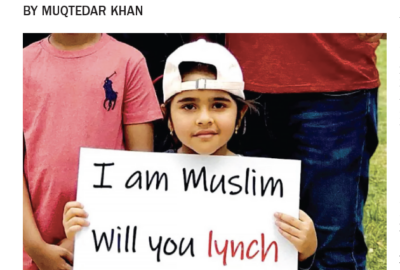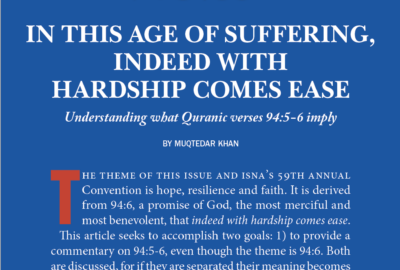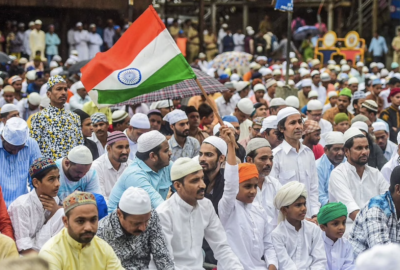Who are Moderate Muslims?
The term moderate Muslims is not only becoming important in the post September 11 discussion of Islam and the West, it is also becoming highly contested. What do we really mean when we brand someone as a moderate Muslim? Indeed the more interesting question is what does the word mean to Westerns, looking-in to Islam, and to Muslims, looking out from within Islam?
As one who identifies himself strongly with the idea of a liberal Islam and also advocates moderation in the manifestation and __expression of Islamic politics, I believe it is important that we flush out this “political identity”. In an era when who we are determines what we do politically, it is imperative that we clarify the “we” in politics.
American media uses the term moderate Muslim to indicate a Muslim who is either pro-western in her politics or is being self-critical in her discourse. Therefore both President Karzai of Afghanistan and Professor Kahlid Abul Fadl of UCLA wear the cap with felicity, the former for his politics the latter for his ideas.
Muslims in general do not like using the term, understanding it to indicate an individual who has politically sold out to the “other” side. In some internal intellectual debates, the term moderate Muslim is used pejoratively to indicate a Muslim who is more secular and less Islamic than the norm, which varies across communities. In America, a moderate Muslim is one who peddles a softer form of Islam – the Islam of John Esposito and Karen Arm Strong – is willing to co-exist peacefully with peoples of other faiths and is comfortable with democracy and the separation of politics and religion.
Both, Western media and Muslims, do a disservice by branding some Muslims as moderate on the basis of their politics. These people should general be understood as opportunists and self-serving. Most of the moderate regimes in the Muslim World are neither democratic nor manifest the softer side of Islam. That leaves intellectual positions as the criteria for determining who is a moderate Muslim, and especially in comparison to whom, since moderate is a relative term.
Both Muslims and the media are generally on the mark when they identify moderate Muslims as reflective, self-critical, pro-democracy and human-rights and closet secularists. But who are they different from and how?
I believe that moderate Muslims are different from militant Muslims even though both of them advocate the establishment of societies whose organizing principle is Islam. The difference between moderate and militant Muslims is in their methodological orientation and in the primordial normative preferences which shape their interpretation of Islam.
For moderate Muslims Ijtihad is the preferred method of choice for social and political change and military Jihad the last option. For militant Muslims, military Jihad is the first option and Ijtihad is not an option at all.
Ijtihad narrowly understood is a juristic tool that allows independent reasoning to articulate Islamic law on issues where textual sources are silent. The unstated assumption being when texts have spoken reason must be silent. But increasingly moderate Muslim intellectuals see Ijtihad as the spirit of Islamic thought that is necessary for the vitality of Islamic ideas and Islamic civilization. Without Ijtihad, Islamic thought and Islamic civilization fall into decay.
For moderate Muslims, Ijtihad is a way of life, which simultaneously allows Islam to reign supreme in the heart and the mind to experience unfettered freedom of thought. A moderate Muslim is therefore one who cherishes freedom of thought while recognizing the existential necessity of faith. She aspires for change, but through the power of mind and not through planting mines.
Moderate Muslims aspire for a society – a city of virtue — that will treat all people with dignity and respect. There will be no room for political or normative intimidation. Individuals will aspire to live an ethical life because they recognize its desirability. Communities will compete in doing good and politics will seek to encourage good and forbid evil. They believe that the internalization of the message of Islam can bring about the social transformation necessary for the establishment of the virtuous city. The only arena in which Moderate Muslims permit excess is in idealism.
Today, the relationship between Islam and the rest is getting increasingly worse. Muslim militants are sowing seeds of poison and hatred between Muslims and the rest of humanity by committing egregious acts of violence in the name of Islam. In this precarious environment, it is important that everyone finds and nurtures the many wonderful examples of moderate Muslims one can still find.
Chandra Muzaffar in Malaysia, Tarik Ramadan in Europe, Maulana Waheeduddin Khan and Asghar Ali Engineer in India, Khalid Abul Fadl and Louay Safi in the US, Karim Soroush and Muhammad Khatami in Iran and many many more who are committed to their Jihad (struggle) to revive the spirit of Ijtihad. Fortunately the tradition is alive globally; it needs the support and the attention of all who aspire for peace and understanding.









“Moderate Muslims aspire for a society – a city of virtue — that will treat all people with dignity and respect…””
what religion are you talking about?
I will argue then that you would not be a true Muslim…one that follows the Koran and teachings of Muhammad.
thank you for the paper on Moderate Muslims. I am curious because I want to learn what the foundational and core teachings of Islam are from someone who is more of the Moderate bent.
any help with that would be appreciated.
thanks
don